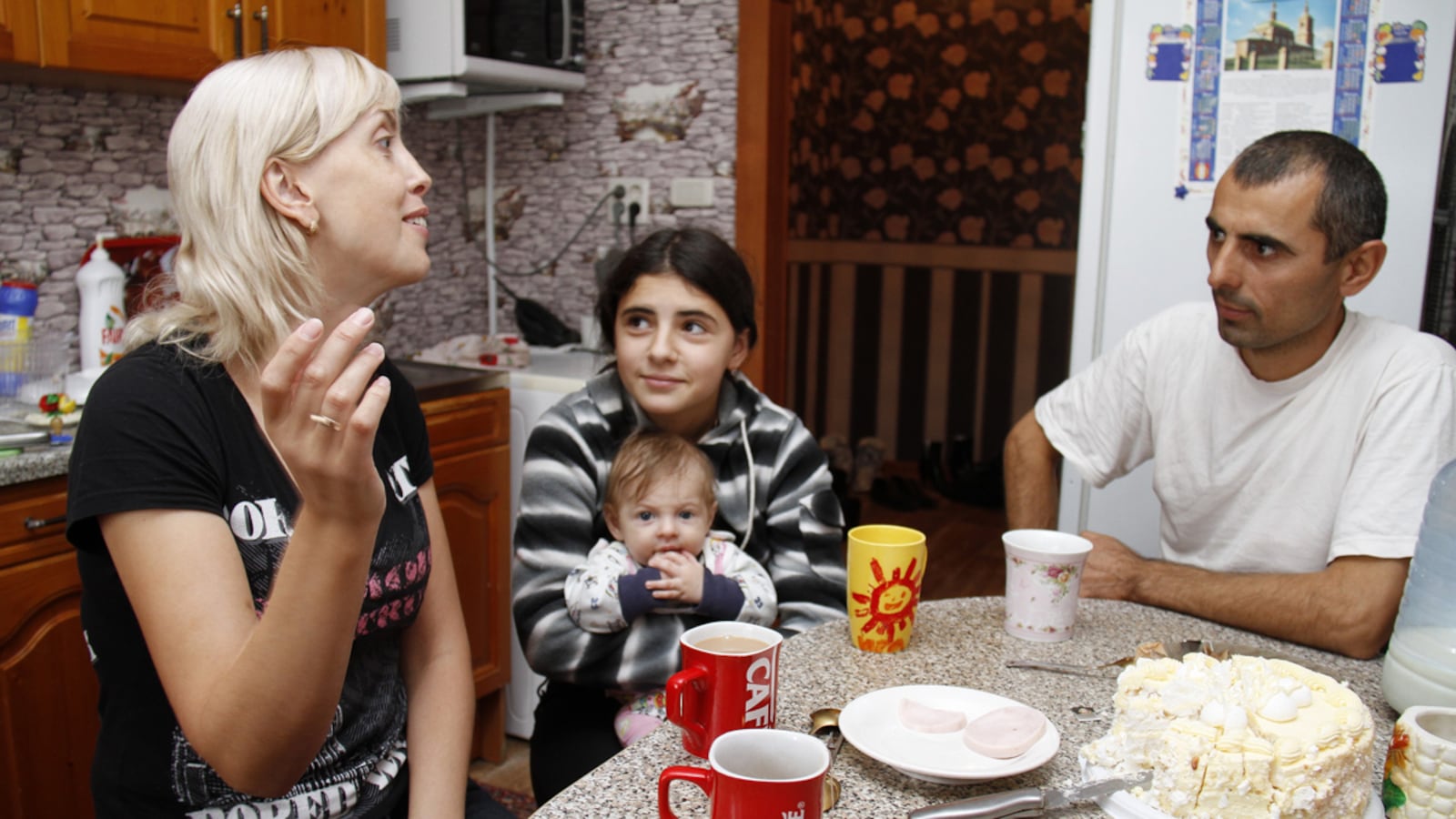Both mothers saw the babies, and should have remembered them.
All Yulia Beliayeva remembers of the night she gave birth, Dec. 17, 1998, was the cursing of the doctors. “The doctors and nurses scolded us for our cries; they gave us humiliating names,” she says.
Who was to blame for the dramatic mix-up that took place at the Kopeisk birth clinic that night, troubling even by the standards of Russian medicine? Ira was born at 2:20 a.m., 15 minutes before Anya. Their mothers were still teenagers; Beliayeva was 18 at the time she gave birth to Anya, and Ira’s biological mother was 16 years old. “I am not excluding the possibility that they swapped our babies on purpose,” Beliayeva says, out of irritation with their cries. Today, the heartbroken parents say they would like the doctors to take full responsibility and go to jail.
But their story of swapped babies in Siberia was discovered two years too late for the criminal law to take force. Both mothers want to keep the child they raised, as one family is Muslim, the other Christian. So all the parents count on now is a possible damage award of $330,000. The court hearing is expected next week.
For 12 years, Beliayeva did not have a shadow of a doubt that her eldest, deeply beloved daughter, Ira, was her real child. The blonde, blue-eyed mother thought that her dark-eyed girl with coal-black hair inherited those features from her grandmother. Ira had her mother’s powerful voice and outgoing character. Ira yelled commands at the boys in the courtyard. This made the young mother feel proud: “She has my leader’s spirit,” Beliayeva says.

The truth turned their life upside down. Last spring her long-divorced husband refused to pay alimony, arguing that Ira was not his biological child, as she looked nothing like him. The court DNA tests proved his suspicions, and more: neither he nor Yulia were Ira’s parents. “I thought my life ended the moment I saw the DNA results,” Beliayeva says. Even now, months after the awful discovery, she immediately bursts into tears. “The first panicky thought was: ‘Where is my own child? Is she even alive?’”
The police got involved. Last month they found Beliayeva’s real daughter, a 12-year-old girl—blonde like her mother. Anya was living in a Muslim family of ethnic Tajik in a sleepy neighborhood across the town of Kopeisk from her real mother. At the first glance of the girl in a long dress, her hair covered with a Muslim scarf, Yulia Beliayeva recognized her child. The girl’s face was a copy of her own teenage photographs.
But the scenario of swapping the now-teenage daughters was not discussed—both families felt solidly about keeping the children they knew. “I am happy that my mother keeps me. I was born under a lucky star. And now I have a new sister,” Ira says. As the biological parents tried to amuse the girls by giving them presents, taking them to the city zoo and fulfilling all their wishes, Ira and Anya became friends. They now look forward to visiting each other’s homes, Ira says.
For Beliayeva, the first joy of making friends with Ira’s father and hearing Anya call her “mother” for the first time was quickly dismissed by new concerns. The lifestyle in the family where Anya, Beliayeva’s biological daughter, had been growing up for 12 years was very different from what she would wish for her daughter, she says. Anya’s father turned down Beliayeva’s ideas to enroll Anya in Ira’s modern-dance class or to send both girls to a vacation resort for a week, as “Islam did not allow that,” Beliayeva says.
“Now I wish I never discovered the truth,” she says. “Every day has been a nightmare, as nothing I wish for my newly discovered daughter is allowed by her father.”
For Ira’s biological father, Naimat Iskanderov, also a divorced parent, the shocking news that Ira has been growing up all these years in a Russian family was just as depressing: “I am barely surviving at my nerve limit. I cannot imagine how hard this must be for a woman,” he told local TV reporters.
Strangely, stories of mixed-up babies in Russia are not uncommon, horrifying young parents in the past. Two years ago, a court ordered a Chechen and a Russian mother to swap their 2-year-old sons, mixed up at a birth clinic in Mitsensk, a central part of Russia. “Since Soviet times there has been a “black market,” where corrupt doctors got paid for dark, almost unimaginable crimes,” says Dr. Irina Korneyeva, who worked at a birth clinic at the early stages of her career.
In late September, Russia’s TV Channel One reported a terrifying statistic: out of 10,000 children born in Moscow, four do not match their mother’s DNA.
With the scandal gaining national attention in Russia, state television allowed the midwife on duty that night at the clinic to speak in her defense. She said the young mothers saw the newborns immediately after birth, and should have recognized the change later.
For most provincial Russian clinics, the idea of the father’s presence at childbirth sounds unacceptable. Even before the baby-swap scandal shook up Kopeisk, the town’s birth clinic did not feel very reliable to Beliayeva’s neighbor, Valeriy Myzdrikov. Two years ago, he was the first father allowed into the labor ward. “I insisted that the clinic would allow me to be a witness at labor and make sure that my child is not dropped or swapped by accident,” Myzdrikov says. “Now, when I see Beliayeva cry over the clinic’s horrible mistake, I thank my intuition.”






